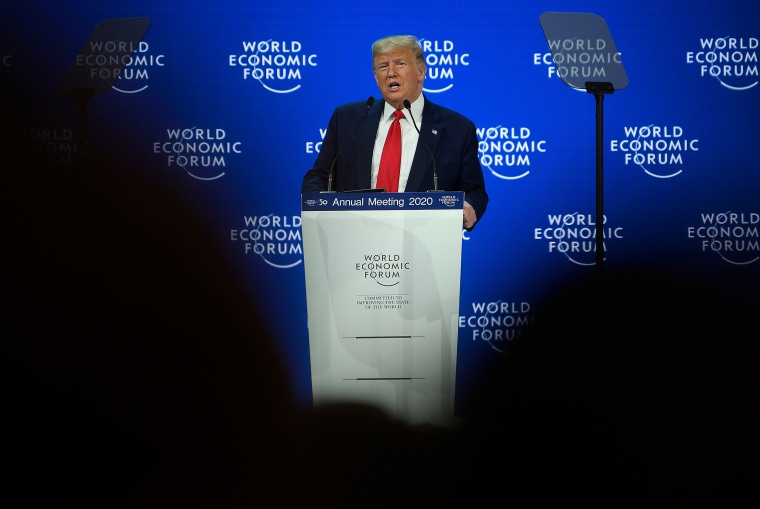President Donald Trump addressed an audience of the global business elite in Davos on Tuesday to make the case that ordinary Americans have been the chief beneficiaries of his administration’s “America first” maxim.
At the World Economic Forum in the Swiss Alps, Trump argued that a regime of tax cuts, regulatory rollbacks and protectionist trade policies have benefited the working class.
“Every decision we make on taxes, trade, regulation, energy, immigration, education and more is focused on improving the lives of everyday Americans,” Trump said, adding that “the well-being of the American worker” was paramount.
On CNBC, National Economic Council director Larry Kudlow echoed the president’s assertions. “Inequality is diminishing right now,” he said. “I think we’re in a better place.”
Many mainstream economists hold a different opinion. While low unemployment and steadily — if slowly — rising wages have improved the fortunes of lower-income Americans, these gains pale in comparison to the investment gains realized by the wealthy few.
“The economic backdrop is such that people’s finances are improving and the stage is set for further improvement… “It’s debatable what all of that’s attributable to,” said Greg McBride, chief financial analyst at Bankrate.com.
In spite of higher incomes, significant wealth-building among the middle class has not manifested, McBride pointed out. “More people are working, more people are making money. The extent to which people have used that backdrop as way to step further towards financial security, such as boosting emergency savings, retirement savings or paying down debt, is still unclear,” he said.
The Republicans’ corporate tax cuts also magnified economic inequality, said Ian Shepherdson, chief economist at Pantheon Macroeconomics.
“The Tax Policy Center says that two-thirds of the gains from the tax cuts in 2018 went to the top 20 percent of the household income distribution, with the top one percent getting 21 percent of the immediate gains,” he said.
“I don’t particularly feel that it’s been evenly distributed across the entire socioeconomic landscape,” said Scott Cole, founder and president of Cole Financial Planning and Wealth Management.
Economists point out that Trump’s policies also have led to a ballooning of the federal deficit, a growth-sapping trade war and a recession in manufacturing, even as the stock market has notched record highs.
“There’s no way that what’s happening right now under a Republican administration is fiscal conservatism,” Cole said.
In his Davos speech, Trump revisited another favorite topic, negative interest rates. “They get paid to borrow money, something I could get used to very quickly. Love that,” he said.
In reality, negative rates would serve to further erode the financial stability of ordinary Americans, said Karen Shaw Petrou, managing partner of consulting firm Federal Financial Analytics.
“We know that they also destroy household savings and long-term retirement security,” she said. “It’s a move that supports stock markets, not personal savings.”
And to the extent that financial security is defined by wealth accrual, a large number of households have still been left behind, McBride said. “We’ve seen scant evidence that Americans, en masse, have moved the needle regarding some fundamental aspects of financial security,” he said.
“Regardless of what the headline is… I would think it’s troublesome if you keep hearing about how great this economy is and you’re not participating in it,” Cole said.
